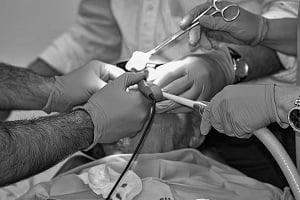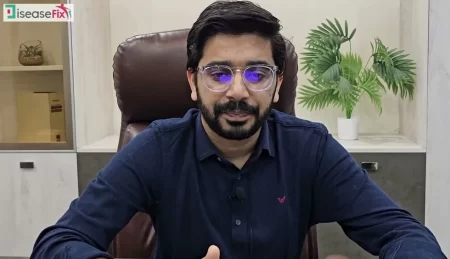GERD Surgery
- Updated on: Jul 29, 2024
- 5 min Read
- Published on Nov 27, 2020

Gastroesophageal reflux disease (GERD) is a chronic or severe condition of acid reflux. This disease is characterized by the backflow of stomach contents into the esophagus. The most common symptoms associated with this disease are heartburn and chest pain. In this disease, people experience an uncomfortable feeling in the middle of the lower chest.
When Is GERD Surgery Recommended?
The GERD surgery depends upon the severity of the symptoms. Mild symptoms can be treated by making some dietary and lifestyle modifications. Besides, some medications may be suggested by the doctors to prevent symptoms like heartburn. Commonly prescribed medications are:
Proton Pump Inhibitors (PPIs): These medicines are suggested to reduce chest pain and heartburn symptoms. The common PPIs are lansoprazole (Prevacid), rabeprazole (Aciphex), and omeprazole (Prilosec, Zergid).
H2 Blockers: These medicines help in reducing gastric acid secretions. Commonly used H2 blockers are famotidine and nizatidine.
Antacids: Doctors prescribe these drugs to avoid the pain and discomfort caused by acid reflux. Some of the examples are Mylanta and Rolaids.
Patients who do not get relief from medications and lifestyle modifications may be recommended GERD surgery. Untreated GERD may lead to many complications such as Barrett’s esophagus, ulcers in the esophagus, and in some cases, may increase the chances of esophageal cancer.
Since GERD is characterized by damaged or weakened LES valve in most cases, the surgery focuses on replacing the LES valve to avoid acid reflux.
Read:
Posture Effects on Your GERD Symptoms
What Are the Surgery Options for GERD?
Studies have found that surgery or anti-reflux operations are the best and effective alternative treatment among all GERD management strategies. Following are some of the recommended surgical options available for patients:
Fundoplication
Fundoplication is a common surgical treatment for GERD. It is generally performed to tighten the lower esophageal sphincter (LES) valve, which lies towards the end of the esophagus and opens into the stomach. In this method, the upper part of the stomach, which lies towards LES, is usually wrapped at an angle of 360 degrees. This stops the backflow of acid into the esophagus.
Fundoplication can be performed by two methods – open surgery and laparoscopic surgery.
Open Surgery Fundoplication: In this procedure, a patient is given general anesthesia. A large incision is then made in the stomach so that the doctor can reach the esophagus. After this type of surgery, the patients need almost 4-6 weeks of bed rest.
Laparoscopic Surgery: It is a less invasive method in which small incisions are made by the doctor in the patient’s stomach and esophagus under general anesthesia. Compared to open surgery, small instruments are used here, and the patient requires just 2-3 days of hospital stay.
In both types of surgeries, the doctor suggests some important steps before the surgery, and these are:
- Taking a liquid diet before 2 days of surgery
- Avoiding any food on the day of surgery
- Taking medicines that will cleanse the bowel a day before surgery
Stretta Procedure
It is a type of endoscopic treatment and is a less invasive surgical treatment for GERD. This procedure generally takes almost 40 minutes and is performed as an outpatient procedure.
In this procedure, a thin and flexible tube containing an electrode at one end is inserted into the esophagus. The electrode at the end of the tube starts heating the esophageal tissues, and small cuts are made in the esophagus. These cuts then form scar tissue in the esophagus. This scar tissue blocks the nerves that usually respond to the acid reflux and helps strengthen and tighten esophageal muscles.
This procedure is quite effective in relieving the symptoms of GERD. The preparation procedure for stretta is similar to Fundoplication. Since it is a new procedure, so long-term side effects are unknown. This surgery is less expensive compared to Fundoplication.
Transoral Incisionless Fundoplication (TIF)
Transoral incisionless fundoplication (TIF) is a type of advanced endoscopy, and it is usually performed when open Fundoplication is unsuccessful. The doctor inserts the endoscope with the help of a TIF device called Esophyx. It allows the doctor to create a barrier between the stomach and the esophagus. The created barrier prevents the backflow of acid from the stomach into the esophagus.
This is a minimally invasive procedure and does not require incisions. Esophyx is inserted into the esophagus through the mouth and creates several folds at the base of the esophagus. These folds create a new valve. The valve is created without a single incision. This can be a good option for the treatment of GERD.
Linx Surgery
Linx surgery uses a special device called Linx. Linx is a ring-like structure consisting of magnetic titanium beads. This device is used to wrap and compress the lower esophageal sphincter (LES). This procedure is performed under the effect of anesthesia. Linx helps in strengthening of LES valve because beads present in the device are magnetized. The magnetic attraction keeps the opening between the stomach and esophagus closed and prevents the backflow of acid from the stomach into the esophagus.
This is a less invasive surgery, and the recovery time of this surgery is shorter than traditional surgeries. Linx surgery usually takes less than one hour. This procedure is less painful and gives good results in the treatment of GERD.
Bard EndoCinch System
Bard EndoCinch system also uses an endoscope. It is like a small sewing machine that is attached to a thin and flexible endoscope. In this type of surgery, with the help of stitches, a valve is formed in the LES, which prevents acid reflux. This procedure is performed to provide strength and tightness to the LES. This is not a common procedure.
What Is the Recovery Time for GERD Surgery?
The recovery time is different for every type of GERD surgery. It also depends on whether the patient has undergone laparoscopic surgery or traditional surgery. The laparoscopic surgery is usually less painful with low recovery time, but it may not be appropriate for all GERD patients. Below mentioned is the recovery time for each type of GERD surgery:
The open surgery method of Fundoplication requires more than one weak hospital stay and about 6-7 weeks rest returning to normal work.
- Laparoscopic fundoplication surgery requires only 2-3 days hospital stay, and the patient can return to work after one week. There is also a less painful procedure.
- The recovery period of stretta surgery is almost 6-7 hours after the patient is discharged from the hospital.
- The patient who has undergone the TIF procedure is discharged on the same day; however, a few days of rest are required for complete recovery.
- The recovery period for Linx surgery is almost six weeks, and during that period, the patient can apply vitamin E oil to the scar.
FAQs
What is the Best Surgery for GERD?
After analyzing the symptoms of GERD patients, the doctor decides which type of treatment will be suitable for the patient. The best surgery according to good results is laparoscopic Fundoplication. This treatment is less invasive and has resulted in approximately 95% patient satisfaction.
Can Acid Reflux Come Back After Surgery?
It is rare, that acid reflux comes back after surgery. While some patients have reported some symptoms of bloating after surgery. According to a study, it has been analyzed that after few 12-13 years, 67% patients who have undergone surgery develop acid reflux symptoms and therefore require medications for heartburn like PPIs and antacids.
Can GERD Make You Feel Unwell?
Yes, GERD can cause feeling of discomfort. The main symptoms associated with GERD are heartburn, chest pain, nausea, indigestion, regurgitation, difficulty in swallowing, sensation of feeling lump in throat, and shortness of breath. It may also cause lack of sleep because GERD is very common during night because as stomach acid secretion is high at that time.
Is GERD Curable or not?
Yes, GERD is curable. GERD can be treated with some medications like antacids, proton-pump inhibitors and H receptor blockers. If these treatments does not prove successful, then surgery may also be performed. Specific surgeries like fundoplication and Transoral incisionless fundoplication (TIF) are proved to be very effective for GERD treatment.











